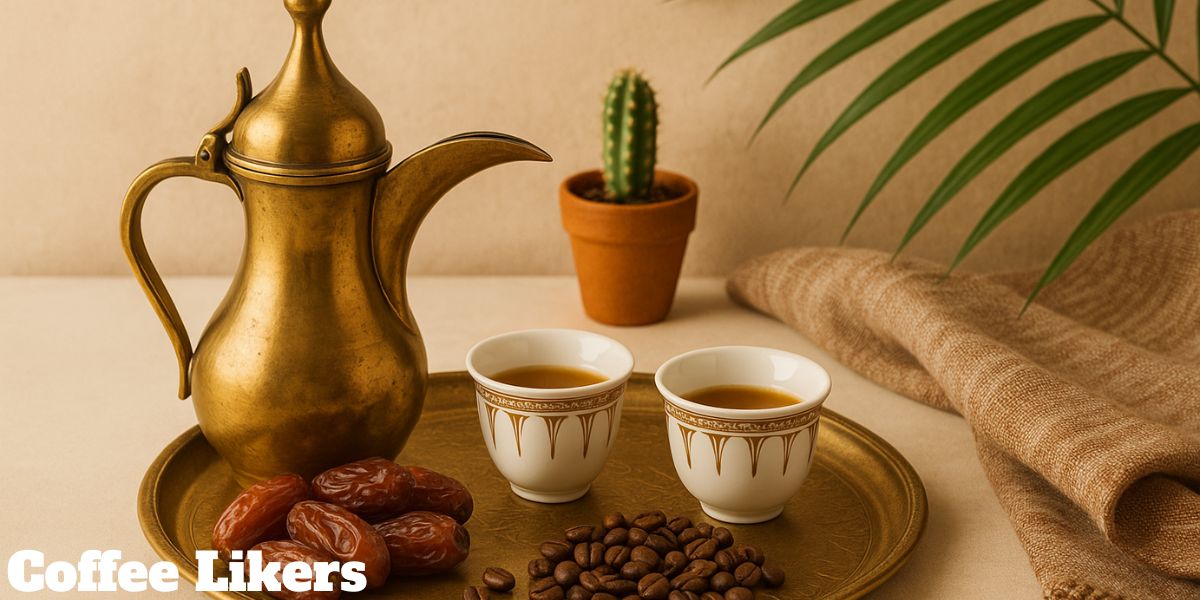Arabic coffee is a popular drink in the Middle East. It is not just for caffeine; it is important in social life and culture. This drink, called “Qahwa,” has a long history of tradition and rituals.
How Arabic coffee is made and enjoyed shows us a lot about daily life in the Arab world. It gives us an interesting look at the customs and values of this region.
In this article, we will look at the Arabic coffee tradition. Arabic coffee is usually served in small cups, often with dates or other sweet treats.
Making Arabic coffee involves roasting green coffee beans, grinding them, and boiling them with water and cardamom. The coffee is then poured into a dallah, a long-spouted coffee pot, and served to guests in a specific order based on age and social status.
This traditional way of serving Arabic coffee promotes hospitality and respect among people. The strong smell and taste of Arabic coffee make it a symbol of kindness and friendship in Arab culture.
What is the significance of Arabic coffee in Middle Eastern culture? Arabic coffee is very important in Middle Eastern culture. It is not just a drink; it is a strong symbol of being friendly and welcoming. People serve it at parties and gatherings. This helps them become closer and show kindness and admiration, making guests feel happy and appreciated.
Arabic Coffee Tradition: Brief Description
At the heart of Arabic coffee tradition, the culture places importance on hospitality. More than just a beverage, this drink symbolizes a long-standing cultural tradition.
In the Arabian world, serving coffee is a way to show welcome and kindness. There is also a deep cultural significance to it.
Making and sharing Arabic Traditional Coffee are essential parts of Bedouin Coffee Heritage. In the Middle East, this custom still plays an important role in daily life.
Arabic coffee brings people together, whether they’re in a busy cafe or under a desert tent. It helps foster a sense of community and connection, demonstrating its continued relevance today.
Arabian Coffee Culture
Across the Arab world, coffee houses are very important in social life. They are not just places to get a drink. They are lively spots where people from different backgrounds come together.
Here, they socialize, talk about news, and enjoy each other’s company. You can often hear lively talks, traditional music, and the sound of backgammon being played.
The coffee culture in the Arab world shows a unique mix of tradition and modern ideas. Traditional Arabic coffee has a precious place in cultural events and daily habits. At the same time, people happily welcome new trends and different types of coffee.
From busy markets to modern malls, coffee houses remain key to social life in the Arab world. They are places where friends meet, share stories, and keep traditions alive.
Bedouin Coffee Heritage
It is well known that Bedouins are kind and courteous. In Bedouin culture, coffee plays an important role. For many years, it has been a key part of their social traditions.
Coffee helps welcome guests and bring people together. Warmth and kindness are associated with coffee in the harsh desert. It provides a needed energy boost during long journeys.
Traditionally, Bedouin women roasted and made the coffee beans. Coffee was brewed over a fire after the beans were crushed by hand. This process often included rhythmic singing and storytelling. It was an important part of their social rituals involving coffee.
In the gathering place of Bedouin tribes, called the majlis, coffee plays a significant role. Serving and sharing coffee with guests is a long-standing custom. It shows respect and helps build strong relationships. This reinforces the Bedouin values of hospitality and kindness.

Arabian Traditional Coffee
In Arabic coffee tradition, the traditional Saudi coffee is a special drink with a light color and rich flavors.
It has a long history in the Kingdom and is an important part of Saudi culture.
The process of making and serving this coffee is steeped in tradition.
Showing how much people value hospitality and honoring guests in Saudi Arabia.
In order to preserve traditional Saudi coffee, the Saudi Culinary Arts Commission works. They host events like coffee festivals and educational programs to teach people about the coffee-making process and its significance in Saudi culture.
Whether you drink traditional Saudi coffee in a majlis or a modern café, it is always a unique and enjoyable experience.
In Saudi Arabia, coffee is typically made in a fancy pot called a dallah. The dallah has a beautiful design with engravings and a long, thin spout, making it easy to pour the coffee into small cups.
Arabic Cultural Coffee Rituals
Arabic coffee is very important in social gatherings. Drinks such as these symbolize hospitality and help people connect. When someone visits a home, serving Arabic coffee shows respect and warm hospitality.
This act is an important part of Arab culture, creating a sense of community and shared traditions.
In many Arab cultures, people serve coffee with their right hand. This simple action is very meaningful. It shows the importance of using the right hand for generosity and honor.
Arabic coffee is everywhere—from family events to daily chats. It is a big part of social customs. This tradition is not only at home but also at work, during meetings, or even when people meet by chance. The Arab world is a stronghold for Arabic coffee.

The History And Cultural Significance Of Arabic Coffee (Qahwa)
Arabic coffee, known as qahwa, is very important in the Middle East. It comes from Arabia and symbolizes hospitality. Cardamom and cinnamon are added to this coffee made from Arabica beans.
Qahwa is a big part of social gatherings. In Bedouin culture, offering coffee with your right hand shows kindness. For many years, this traditional coffee has played a key role in Arab culture, showcasing the skill of brewing and the spirit of hospitality.
Traditional Preparation Methods For Arabic Coffee
Traditional Arabic coffee is made by first cooking green coffee beans. The beans are cooked in a flat pan over heat. They are always moved to cook evenly.
Arabic coffee is usually lightly or moderately cooked, which gives it a lighter taste. Once the beans are cooked, they are cooled right away. Then, they are finely ground. In order to do this, a mortar and pestle could be used, or a coffee grinder could be used.
An Arabic coffee pot, known as a dallah, is used to make Arabic coffee from finely ground coffee. Water is added, and sometimes spices are included.
Among these spices are cardamom, cloves, and saffron. The coffee is heated until it boils on a stovetop or fire. Arabic coffee is typically made three times, becoming stronger with each brew.
Ingredients Used In Arabic Coffee And Their Importance
Authentic Arabic coffee starts with good Arabica beans. This type is chosen for its smooth and nice taste.
Light roasting preserves the delicate flavors and smells of the beans.
This is different from the darker roasts found in other coffee styles. This is what gives Arabic coffee its unique flavor.

In Arabic coffee, cardamom is the most popular spice. It adds a warm and slightly sweet flavor. Cardamom pods are lightly crushed before being used. This releases their wonderful scent, and they are added during brewing. This gives the coffee a special taste and complexity.
Another popular spice in Arabic coffee is saffron. It is known for its nice smell and pretty color. A tiny pinch of saffron threads is often added for a luxurious feel and a subtle earthiness in the final drink. These spices are not just for taste. They also show cultural traditions and the rich food heritage of the region.
The Role Of Arabic Coffee In Social Gatherings And Hospitality
Arabic coffee is very important in Arab hospitality. It helps bring people together. It is a key part of social gatherings, no matter their size or formality. Whether it’s a quick visit with friends, a family event, or a business talk, coffee is served to show welcome and respect.
In many Arab homes, the majlis is the main space for hosting guests. This is where coffee is specially served. It’s a place where conversations happen, relationships grow stronger, and traditions are passed down. The way coffee is served is often a beautiful display of hospitality.

Etiquette And Customs Associated With Serving And Drinking Arabic Coffee
Coffee is served according to special rules in Arab culture. The host pours the coffee into small cups without handles and fills them about one-third full. Coffee is given with the right hand by the host. This shows respect and honor.
If you receive a cup of coffee, it is polite to take it with your right hand. This shows you appreciate the hospitality. While drinking, don’t blow on the coffee to cool it down.
Enjoy the smell and take small sips. If you do not want more coffee, gently shake the cup from side to side. This means you have had enough.

Health Benefits Associated With Consuming Arabic Coffee In Moderation
As with other types of coffee, Arabic coffee contains caffeine.
Caffeine is a natural stimulant that can help you feel more awake and focused.
There is some evidence that drinking
coffee in moderation may have health benefits. These include improved brain function and a reduced risk of certain diseases, such as type 2 diabetes and Parkinson’s.
It’s important to drink Arabic coffee in moderation. Enjoy its flavor and customs, but be mindful of how much you can handle. Drinking excessive caffeine can cause side effects, such as feeling nervous, difficulty sleeping, and a faster heart rate.
Symbolism Of Offering Arabic Coffee In Middle Eastern Societies
Drinking a moderate amount of coffee may be beneficial to your health. It has a big meaning in Middle Eastern societies. It shows kindness and welcomes visitors.
This action reflects admiration, respect, and friendliness, which are very important in Arab culture. If someone says no to a cup of coffee, it might be seen as rude or interesting.
In some Arab cultures, giving coffee is also a way to start chats or discussions. When someone says yes to a cup, it means they are open to making connections and having talks.

Different Variations Of Arabic Coffee Across The Middle East
Arabic coffee is brewed differently across the Middle East. These kinds can vary in the types of coffee beans used, how the beans are cooked, the spices added, and even how the coffee is served.
For instance, some areas might use cloves and cinnamon in their coffee, while others may stick to a simple mix with just cardamom.
Although the main ideas of Arabic coffee customs remain the same, these differences bring a nice variety. Styles reflect the history and culture of a particular region. This creates a diverse mix of coffee customs that get passed down through the years.
How To Make A Perfect Cup Of Arabic Coffee At Home
Making a delicious cup of Arabic coffee at home is simple if you follow a few easy steps. Start by choosing freshly roasted Arabica beans. Cardamom pods are essential for authentic flavor.
To release the aroma of the cardamom pods, crush them gently, then grind them with a bit of coffee. Combining this spice with the right brewing method will result in a cup that embodies the true essence of Arabic coffee.
Mix the ground coffee and cardamom with water in a cezve, a long-handled pot. Take the coffee off the heat when it foams up, and then let it sit for a few minutes.
Repeat this process two more times. This brewing technique will yield a rich and flavorful cup. Savour the flavor in small cups!
Unique Serving Vessels And Presentation Styles For Arabic Coffee
Arabic coffee has special flavors that many people love. It is also known for its stylish way of serving. The dallah is a traditional Arabic coffee pot that stands out as a symbol of this valued custom.
It is made from brass or copper, often featuring beautiful engravings. You can find the dallah in many Arab homes.
The Arabic coffee is served in small cups known as finjans, which don’t have handles. Their smell enhances the coffee’s aroma and encourages sipping.
The cups are often beautifully decorated, which makes the whole coffee-drinking experience more pleasing to the eye. The way Arabic coffee is presented shows how much importance is placed on hospitality and the love for beauty in daily life.
Modern Twists And Innovations In The World Of Arabic Coffee
Arabic coffee has a strong tradition, but it also welcomes new ideas and changes. Nowadays, many cafes in the Middle East serve creative twists on Arabic coffee.
Coffee shops in Dubai, for example, add flavors like rosewater and saffron. Some places even try cool methods like cold brew. These modern takes still show respect for the old ways of making coffee.

In the United States and other places around the world, specialty coffee shops have added Arabic coffee to their menus. This mix of classic flavors and new methods shows how popular Arabic coffee is and how it can change with time.
Popular Accompaniments With Arabic Coffee, Such As Dates Or Sweets
Arabic coffee has strong flavors that taste good when compared to traditional snacks. Dates are a good choice because they are sweet and go well with the coffee.
The sweet dates make the bitter coffee taste better, creating a yummy and satisfying flavor. Sweets with a light, flowery smell are often served with Arabic coffee too.
Baklava is a favorite. It has layers of pastry, nuts, and honey that create a mix of textures and a burst of sweetness that matches the strong coffee taste.
These snacks make the coffee experience better, showing the perfect combination of sweet and savory that is part of Arabic coffee culture.
FAQ About Arabic Coffee Tradition
What Is The Etiquette For Arabic Coffee?
In Arab culture, it is important to use your right hand when you serve or receive coffee. This shows respect. You should accept at least one cup to honor your host’s generosity. However, it is fine to decline more cups if you want.
What Is The Significance Of Arabic Coffee?
Qahwa, which is the traditional name for it, represents hospitality in the Arab world. It’s not just a drink; it shows generosity and welcomes guests. Qahwa helps build connections and is a key part of social gatherings.
What Is The Traditional Arabic Coffee Called?
In Arab culture, traditional Arabic coffee is called “Qahwa.” In places like Saudi Arabia, you might also see it spelled as “Gahwa.” This name represents the deep history, tradition, and importance of this popular drink.
How To Serve Traditional Arabic Coffee?
Serve traditional Arabic coffee in a “dallah.” Use your right hand to pour a small amount into small cups that have no handles. This shows good hospitality and follows the usual etiquette.
Final Thought
The tradition of Arabic coffee is more than just about drinking coffee. It shows a deep cultural heritage based on being friendly and giving. Coming together creates a sense of happiness.
As coffee trends change, we can expect new ideas and styles. However, the core of Arabic coffee—its ability to build connections, the rituals it creates, and the cultural values it carries—will keep growing strong.
The strong smell and special taste of Arabic coffee continue to capture coffee fans worldwide, making sure of its legacy for generations to come.
The lasting Arabic coffee tradition serves as a reminder of the importance of keeping cultural customs and sharing them with future generations. Thanks, and you are welcome to our website.





Leave a Reply